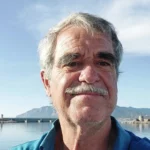From the idea of connecting Europeans, we’ve grown into a dynamic project with team members from more than 12 European countries. Over the past four years, we’ve learned so much about European politics and diverse perspectives. Many of us have become friends. Our community is constantly coming up with new ideas for activities. It’s incredible what a diverse team can achieve.
MeetEU is an initiative that promotes engagement in European topics and was born around the 2019 European elections. It emphasises inclusive participation in European events and is welcoming of all backgrounds. The events offer casual English discussions and allow direct conversations with speakers. Using platforms from Instagram to Discord, MeetEU reaches a broad audience, maintaining a core group while continually attracting newcomers.
Participation is about actively sharing and discussing opinions. It’s not limited to formal roles or politicians; it’s about influencing a diverse group. Simple acts, like joining a meeting or engaging on social media, count! Everyone has expertise, and sharing it can make a difference. The goal is to unite opinions and approach decision-makers with shared ideas.
Tina Löhr and Moritz Wille, the Co-Presidents of the MeetEU initiative, share their experiences in leading this dynamic project.
How did Tina and Moritz become involved with the initiative?
Tina first engaged with MeetEU in 2019 during the European elections. She was active in the This Time I’m Voting campaign, using platforms like Instagram to promote the elections, and even developed a website about the EU’s benefits. In Munich, she helped to organise an event with Pulse of Europe. Post-elections, Tina’s interactions with EU enthusiasts, led her to envision MeetEU, a platform for Europeans to converse and share views. With support from her virtual group, they launched MeetEU. They initially used Discord for events, but later shifted to Zoom for its familiarity. Despite some team members’ doubts, Tina and Moritz persevered, and they organised frequent events, reaching over 160 by 2023.
Moritz’s European engagement began at 17 during the 2019 European elections. Unable to vote due to his age, he helped motivate adults to participate. He conducted workshops and engaged in street activities, and he broached people on why it is important to vote, how they can voice their concerns and how they can influence the future of Europe. After the elections, he met Tina and was intrigued by her vision for MeetEU. Despite being volunteers with limited resources, they pursued the project. As Moritz studies in France, he dedicates his free time to MeetEU, viewing it as a passion rather than work.
What motivated you to deeply engage with and commit to the MeetEU initiative?
Tina, with her two-decade experience as a copywriter, has always been at the forefront of ideation for her clients. However, her involvement in the This Time I’m Voting campaign during the European elections sparked a personal connection. Through this campaign, she met various individuals across Europe and formed the foundational group for MeetEU. Their positive feedback during the initial pilot projects in November 2019 solidified her belief in the potential of MeetEU.
Moritz was captivated by MeetEU’s innovative approach, which emphasised digital collaboration across diverse backgrounds and age groups. While he valued working with his peers, the opportunity to collaborate with individuals from different generations and professions was particularly enticing. The team’s diversity, spanning from copywriting professionals to those affiliated with tech giants like Google, enriched the initiative. Moritz’s previous engagements became instrumental when inviting the Members of the European Parliament (MEPs) to the platform. The digital nature of MeetEU and the chance for intergenerational collaboration were the standout features that drew him in.
How did you manage to grow and diversify the volunteer base of MeetEU?
The expansion of our volunteer base happened organically. As we conducted more events, certain attendees became regulars, and their continuous involvement led them to join the core organising team. Our Discord server, with over one thousand subscribers, became a central gathering place for European enthusiasts. Conversations on this platform often resulted in members wanting to be more involved in organisational aspects. Our growth was not structured, but it was a natural coming together of individuals united by their passion, mainly through social media.
MeetEU prides itself on its inclusivity. Everyone is welcome to contribute and even take the lead in organising events. We’ve created an environment where anyone, regardless of their background, can initiate and lead discussions on topics they care about. For instance, there was an event about the last Hungarian elections, which was organised by a community member. While we do have sessions with public sector officials and politicians, we also value events led by community members of all ages. The beauty of MeetEU is its simplicity. There’s no bureaucracy or fees, just open engagement. We believe this modern approach sets us apart from larger organisations.
How do you ensure quality in events organised by newcomers to MeetEU, especially when discussing sensitive subjects like national elections?
Take, for instance, these aforementioned events focusing on elections. We posted a call on our Discord platform, looking for someone to present the elections in their country. Within days, we had students volunteering to offer insights on the electoral process, its implications for Europe and the stakes involved. While we encourage freedom of speech, it’s essential to ensure that our platform doesn’t become a ground for extremist views, be it from the left or right. So we engage in preliminary chats to understand the background and intent of the presenter. This ensures a balanced, informative and open discussion space.
For newcomers to our team, we also have a mentoring programme. While it’s optional, it has been well-received, with most new members opting in. This ensures that the first event they organise or participate in is supervised by a seasoned team member.
Our events are inclusive and promote European values. We ensure that discussions respect democracy and human rights and steer clear of any content against these principles. Within our team, we’ve set an expectation to provide a neutral space for European public discourse.
To aid our new members, we’ve created workshop materials. For those unfamiliar with organising workshops, we offer a toolkit that provides a step-by-step guide, much like a cooking recipe. Each phase of the event organisation is broken down, from gathering the necessary ingredients to the final presentation. This cooking analogy resonates well with our members, making the process intuitive and relatable.
Who typically attends MeetEU events?
Our audience spans a broad spectrum, with an average age of around 30, but it also includes both teenagers and even people over 80. We primarily attract Europeans, but we also have participants from the US, India and Central Africa. Gender distribution is balanced, though it can vary by topic. Interestingly, despite being a French Association, we see fewer French participants than anticipated. Our events thrive on the diversity of attendees. Conversations in European English often lead to insightful and humorous exchanges, adding to the event’s appeal.
Given that you’re reaching out to such a broad audience, how do you ensure that your content remains accessible, especially to those unfamiliar with the intricacies of the European Union?
Accessibility is at the heart of MeetEU. We aim to create an environment where everyone, irrespective of their prior knowledge about the EU, can engage in conversations. To cater to different knowledge levels, our events range from beginner sessions, where we discuss basic concepts, to advanced sessions that dive deeper into specific EU topics. We’ve also been exploring ways to further enhance accessibility. For instance, we’re considering integrating automatic translation tools into platforms like Zoom, which will allow for real-time translations into multiple languages.
Any examples of follow-up activities/impacts on the participants?
Apart from positive feedback from the participants, their ideas and remarks are also being put in practice. Just recently, the city of Strasbourg has announced its plans to investigate whether electrical vehicles can be used as mobile power banks. In October 2021, during our digital Citizen-Mayors event, one of the participants from Sweden proposed it to Jeanne Barseghian, the Mayor of Strasbourg. This is only one out of many examples in which bringing together citizens with politicians across borders can foster creative solutions for the challenges of tomorrow.
How do you envision the platform evolving in the coming years?
Our goal for MeetEU is to be the top platform for European talks. While we have many followers, we want to grow more. We plan to add more voices, especially from less-represented areas. Using technology, like instant translation tools, will help remove language issues and make our events easier to join.
Project outcomes
Since 2020, MeetEU has hosted over 170 Zoom events featuring Members of the European Parliament, European Commission representatives, various EU agencies, EU activists and scientists. With participants hailing from across the EU member states and beyond, our gatherings adopt a coffee table approach, fostering open and direct dialogues with policymakers. Here, there are no ‘stupid’ questions – only a lively exchange of ideas. This unique platform places the focus on people, ensuring engaging discussions that transcend traditional panel formats.
About the project
Supported by:
Other
EU Youth Programme Priority:
Digital Transformation
Participation in Democratic Life
Topic:
Youth Participation / Activism and Decision Making
Youth Participation / Promoting Participation for All
Youth Participation / Skills Development and Volunteering
Media, Information & Critical Thinking
Digital Participation
Youth Goals:
Visibility:
Alongside our engaging website and active social media presence across platforms like Instagram, Facebook, Reddit and LinkedIn, MeetEU ensures event announcements reach people across Europe. We feature our events on our website, partner sites and through a weekly newsletter (register to receive!). Additionally, stay tuned to our Discord group – now over 1,100 members strong!
Organisations involved:
MeetEU is represented through non-profit associations exclusively run by volunteers in both France and Germany.












